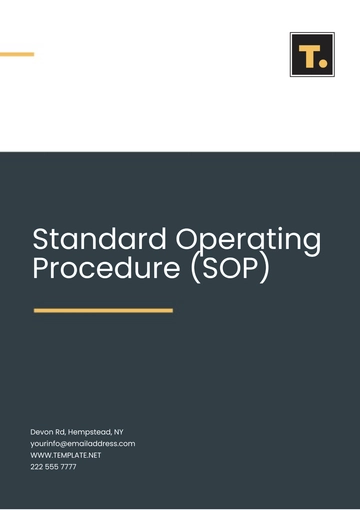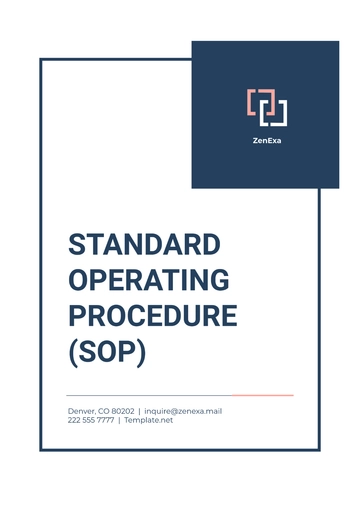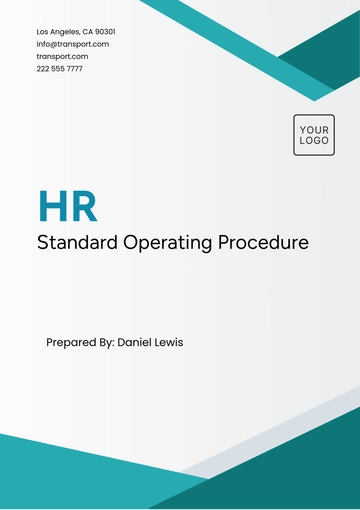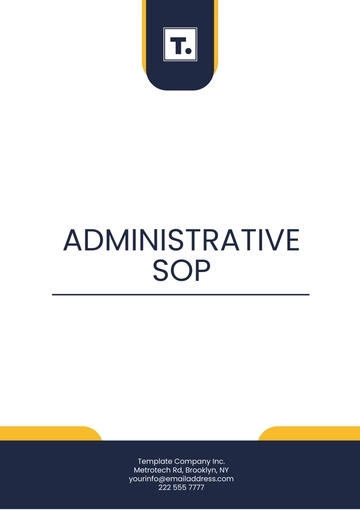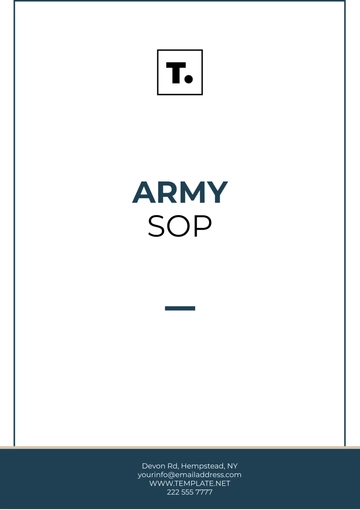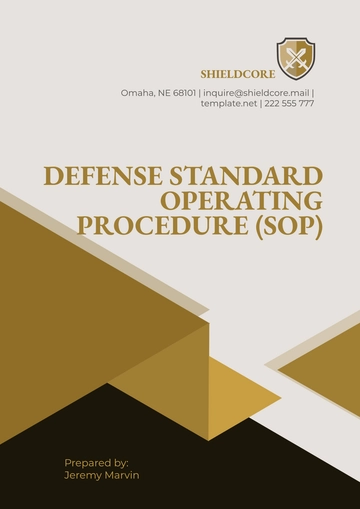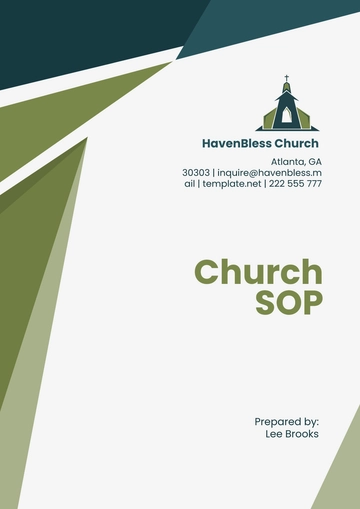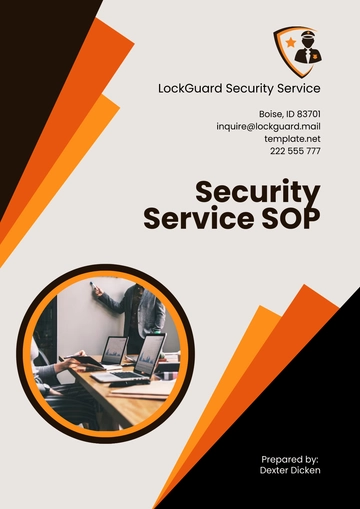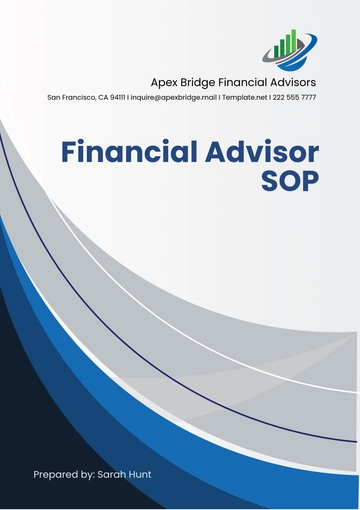Free Church SOP
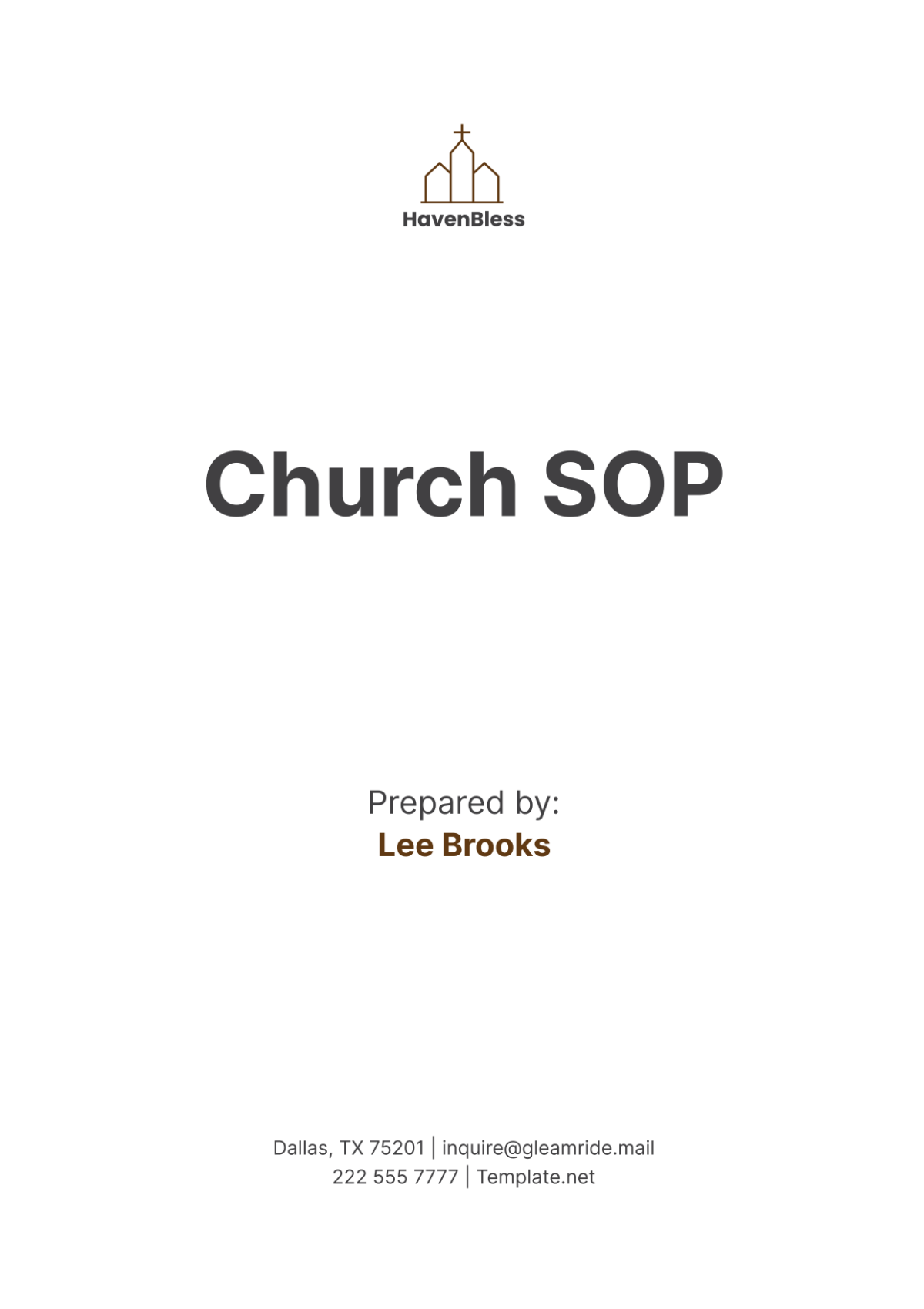
I. Introduction
A. Purpose
The purpose of this Standard Operating Procedure (SOP) document is to provide a comprehensive guide for the operation, management, and administration of [Your Company Name] Church. This SOP outlines the standard practices and procedures to ensure the efficient and effective functioning of the church. It is designed to maintain consistency, accountability, and transparency in all church activities. By following these procedures, [Your Company Name] Church aims to create a welcoming and organized environment for all members and visitors, promoting spiritual growth and community engagement.
B. Scope
This SOP applies to all church members, staff, volunteers, and anyone involved in the operations of [Your Company Name] Church. It covers various aspects of church management, including but not limited to, worship services, administrative tasks, financial management, community outreach, and event planning. The procedures outlined herein are intended to provide clear guidelines to ensure that every aspect of the church's operations is conducted in a manner that reflects its mission and values.
C. Objectives
To establish clear and standardized procedures for church operations: This ensures that all activities are performed consistently and efficiently, regardless of who is responsible for them.
To ensure the smooth and efficient functioning of all church activities: By having predefined procedures, the church can avoid unnecessary disruptions and delays.
To promote transparency and accountability within the church community: Clear procedures and documentation help to ensure that all actions are accountable and transparent to the congregation.
To provide guidance for church staff and volunteers in performing their duties: Detailed procedures assist in training and supporting staff and volunteers, ensuring that they are well-prepared to fulfill their roles.
To enhance the overall experience of church members and visitors: By maintaining a well-organized and welcoming environment, the church can foster a positive and enriching experience for everyone who attends.
II. Church Governance
A. Organizational Structure
Church Leadership:
1.1 The Senior Pastor is the spiritual leader and primary decision-maker of the church. They are responsible for providing spiritual guidance, overseeing worship services, and ensuring that the church's mission and vision are carried out effectively.
1.2 The Church Board consists of elected members responsible for overseeing the administrative and financial aspects of the church. They work closely with the Senior Pastor to make decisions that affect the church's operations and long-term planning.
1.3 Ministry Leaders head various ministries within the church, such as Youth, Women, Men, and Outreach Ministries. They are tasked with organizing and leading activities that cater to the specific needs and interests of their respective groups.
Committees and Teams:
2.1 The Finance Committee manages the church’s financial matters, including budgeting and expenditure. They are responsible for ensuring that the church's finances are handled with integrity and transparency.
2.2 The Worship Team coordinates all aspects of worship services, including music and liturgy. They work together to create meaningful and inspiring worship experiences for the congregation.
2.3 The Hospitality Team oversees welcoming and assisting visitors and members during church services and events. They play a crucial role in ensuring that everyone feels welcomed and valued.
B. Roles and Responsibilities
Senior Pastor:
1.1 Provides spiritual leadership and pastoral care to the congregation. This includes offering counseling, leading prayer sessions, and being available for members in times of need.
1.2 Prepares and delivers sermons. The Senior Pastor spends considerable time in prayer and study to prepare messages that are both inspiring and educational.
1.3 Oversees the administration and management of the church. This includes supervising staff, coordinating church activities, and ensuring that all aspects of the church's operations run smoothly.
Church Board Members:
2.1 Participate in decision-making processes. Board members work together to make important decisions that affect the church's direction and operations.
2.2 Approve budgets and financial reports. They review and approve the church's financial plans to ensure fiscal responsibility.
2.3 Provide support and guidance to the Senior Pastor. Board members offer advice and assistance to the Senior Pastor, helping to implement the church's vision and goals.
Ministry Leaders:
3.1 Organize and coordinate ministry-specific activities. They plan events, meetings, and activities that cater to the needs of their ministry group.
3.2 Recruit and train volunteers. Ministry Leaders are responsible for finding and preparing volunteers to help with ministry activities.
3.3 Report to the Church Board on ministry progress and needs. They provide updates on their ministry's activities and seek support or resources as needed.
III. Worship Services
A. Service Planning
Worship Schedule:
1.1 Regular Sunday Services: Held every Sunday at 9:00 AM and 11:00 AM. These services include a blend of traditional and contemporary worship styles to cater to the diverse preferences of the congregation.
1.2 Midweek Services: Held every Wednesday at 7:00 PM. Midweek services provide an opportunity for deeper study, prayer, and fellowship.
1.3 Special Services: Includes Christmas Eve, Easter, and other significant dates. These services often feature special programs, music, and activities to celebrate important events in the Christian calendar.
Order of Service:
2.1 Opening Prayer: Led by the Worship Leader. This sets the tone for the service and invites the congregation to prepare their hearts for worship. 2.2 Praise and Worship: Led by the Worship Team. A time of singing and music to praise and glorify God.
2.3 Scripture Reading: Conducted by an assigned reader. Selected passages from the Bible are read to provide a foundation for the sermon and worship.
2.4 Sermon: Delivered by the Senior Pastor or guest speaker. A message that teaches and inspires the congregation based on biblical principles.
2.5 Offering: Managed by the Finance Committee. A time for the congregation to give their tithes and offerings to support the church's ministry and operations.
2.6 Closing Prayer and Benediction: Led by the Senior Pastor. A final prayer to bless the congregation as they go out into the world.
B. Worship Team Coordination
Practice Sessions:
1.1 Weekly rehearsals on Thursday evenings at 6:00 PM. These sessions allow the Worship Team to prepare and practice the music for upcoming services.
1.2 Special rehearsals scheduled as needed for upcoming events. Additional practice sessions are held to prepare for special services and events, ensuring everything runs smoothly.
Music Selection:
2.1 Songs are selected by the Worship Leader and approved by the Senior Pastor. The selection process ensures that the music aligns with the theme of the service and enhances the worship experience.
2.2 Music should align with the theme of the service and be appropriate for congregational singing. This includes choosing songs that are easy for the congregation to sing and that support the message of the sermon.
Technical Support:
3.1 The AV (Audio-Visual) Team ensures all sound and visual equipment are functional. This includes testing microphones, speakers, projectors, and other equipment before the service.
3.2 The AV Team coordinates with the Worship Team for seamless transitions during the service. They manage sound levels, slides, and other technical aspects to enhance the worship experience.
IV. Administrative Procedures
A. Office Management
Office Hours:
1.1 The church office is open Monday to Friday from 9:00 AM to 5:00 PM. During these hours, staff members are available to assist with administrative tasks and answer inquiries.
1.2 The office is closed on public holidays and during special church events. Notices of closures are communicated in advance to avoid any inconvenience.
Record Keeping:
2.1 Maintain accurate and up-to-date records of church members, including contact information and membership status. This information is vital for communication and planning purposes.
2.2 Keep records of all church activities, including meeting minutes, event plans, and service schedules. Proper documentation ensures that there is a clear record of all church activities and decisions.
Communication:
3.1 Use multiple channels to communicate with the congregation, including email, social media, and printed bulletins. Effective communication ensures that all members are informed and engaged.
3.2 Ensure timely dissemination of important announcements and updates. This includes informing the congregation about upcoming events, changes in schedule, and other important news.
B. Financial Management
Budgeting:
1.1 The Finance Committee prepares an annual budget, which is reviewed and approved by the Church Board. The budget outlines expected income and expenses for the year, ensuring financial planning and sustainability.
1.2 The budget should include provisions for all expected income and expenses. This includes regular operating costs, salaries, ministry expenses, and special projects.
Fundraising:
2.1 Organize regular fundraising events to support church activities and community outreach. These events not only raise funds but also build community spirit and engagement.
2.2 Ensure transparency and accountability in the handling of funds raised. All fundraising activities should be documented, and funds should be used as intended.
Financial Reporting:
3.1 The Finance Committee prepares monthly financial reports for review by the Church Board. These reports provide an overview of the church's financial status and help in making informed decisions.
3.2 Annual financial statements are presented to the congregation at the annual general meeting. This practice promotes transparency and allows members to understand the financial health of the church.
C. Human Resources
Staff Recruitment:
1.1 Follow a standard recruitment process, including advertising the position, reviewing applications, and conducting interviews. This ensures that the church hires qualified and suitable candidates for all positions.
1.2 Ensure all hires are approved by the Church Board. This adds an extra layer of oversight and ensures that hiring decisions align with the church's needs and values.
Volunteer Management:
2.1 Develop a volunteer program to recruit, train, and retain volunteers. Volunteers are essential to many church activities, and a structured program helps in managing and supporting them effectively.
2.2 Recognize and appreciate the contributions of volunteers. This can be done through formal recognition programs, thank-you notes, and volunteer appreciation events.
Staff and Volunteer Training:
3.1 Provide regular training sessions to ensure all staff and volunteers are equipped with the necessary skills and knowledge. Training topics can include safety procedures, communication skills, and specific job-related tasks.
3.2 Conduct orientation sessions for new staff and volunteers to familiarize them with the church's policies, procedures, and culture. This helps new team members integrate smoothly and understand their roles.
V. Community Outreach
A. Programs and Activities
Food Pantry:
1.1 Operate a weekly food pantry to assist those in need. The food pantry provides essential groceries and supplies to families and individuals facing financial difficulties.
1.2 Partner with local businesses and organizations to ensure a steady supply of food items. Collaborations with community partners help in sustaining the food pantry and expanding its reach.
Clothing Drives:
2.1 Organize quarterly clothing drives to collect and distribute clothing to those in need. Clothing drives provide an opportunity for the congregation to give back and support the less fortunate.
2.2 Work with local shelters and social service agencies to identify those in need of clothing. Collaborating with other organizations ensures that donations reach those who need them most.
Educational Programs:
3.1 Offer tutoring and after-school programs for children and youth. These programs support the academic and personal development of young people in the community.
3.2 Provide adult education classes, such as literacy and job skills training. Adult education programs help community members improve their skills and enhance their employment prospects.
B. Partnerships
Local Organizations:
1.1 Establish partnerships with local non-profits and community organizations to extend the reach of the church's outreach efforts. Working together with other organizations can amplify the impact of community programs.
1.2 Collaborate on community projects and events to address local needs. Joint initiatives can bring together resources and expertise from multiple organizations to address community issues effectively.
Government Agencies:
2.1 Work with local government agencies to identify community needs and resources. Government agencies can provide valuable data and support for community outreach efforts.
2.2 Apply for grants and funding opportunities available through government programs. Securing additional funding can enhance the church's ability to serve the community.
Other Churches:
3.1 Form alliances with other churches to collaborate on outreach programs. Inter-church collaborations can bring together diverse resources and foster a sense of unity within the larger faith community.
3.2 Participate in ecumenical events and activities to promote unity and shared mission. Ecumenical events provide opportunities for fellowship and collaboration across different denominations.
VI. Event Planning
A. Annual Events
Easter Celebration:
1.1 Plan and execute a special Easter service with activities for all ages. The Easter service is one of the most significant events in the church calendar, celebrating the resurrection of Jesus Christ.
1.2 Include a community outreach component, such as an Easter egg hunt or charity drive. These activities engage the wider community and provide opportunities for outreach.
Christmas Program:
2.1 Organize a Christmas Eve service and a Christmas Day celebration. These services often include special music, readings, and performances to celebrate the birth of Christ.
2.2 Host a Christmas party for the congregation, including a meal and fellowship. The Christmas party provides an opportunity for members to come together and celebrate in a festive atmosphere.
Vacation Bible School (VBS):
3.1 Plan and conduct a week-long VBS during the summer for children in the community. VBS offers a fun and educational program that teaches children about the Bible through activities, games, and lessons.
3.2 Recruit and train volunteers to lead and assist with VBS activities. Volunteers play a crucial role in making VBS a success, providing support and guidance to the children.
B. Special Events
Guest Speakers:
1.1 Invite guest speakers for special services or seminars. Guest speakers can bring new perspectives and insights to the congregation.
1.2 Promote these events to the wider community to attract more attendees. Effective promotion helps to maximize attendance and impact.
Workshops and Seminars:
2.1 Organize workshops and seminars on relevant topics, such as parenting, financial planning, and spiritual growth. These events provide valuable learning opportunities for members and the wider community.
2.2 Ensure that qualified speakers and facilitators lead these events. Quality presenters enhance the credibility and effectiveness of the workshops and seminars.
Community Fun Days:
3.1 Plan and host community fun days with activities for all ages. These events can include games, food, music, and other attractions that appeal to a wide audience.
3.2 Use these events as an opportunity for outreach and engagement with the community. Community fun days provide a relaxed and enjoyable environment for building relationships and sharing the church's mission.
C. Logistics
Venue Booking:
1.1 Ensure that the church venue is booked and prepared for all events. This includes coordinating with the church office to reserve spaces and arrange necessary setups.
1.2 Arrange for any additional equipment or furniture needed for the event. This may include sound systems, seating, tables, and decorations.
Volunteer Coordination:
2.1 Recruit and assign volunteers to various roles for event support. Volunteers are essential for tasks such as setup, registration, hospitality, and cleanup.
2.2 Provide clear instructions and training to volunteers. Proper preparation ensures that volunteers are confident and capable in their roles.
Safety and Security:
3.1 Implement safety protocols for all events, including emergency procedures. Ensuring the safety of attendees is a top priority.
3.2 Coordinate with local law enforcement if necessary to ensure a safe environment. For larger events, additional security measures may be required.
VII. Health and Safety
A. Facility Maintenance
Regular Cleaning:
1.1 Ensure that all church facilities are cleaned and sanitized regularly. Regular cleaning helps to maintain a healthy and welcoming environment.
1.2 Schedule deep cleaning sessions periodically for thorough maintenance. Deep cleaning addresses areas that may not be covered by routine cleaning.
Repairs and Inspections:
2.1 Conduct regular inspections to identify and address any maintenance issues. Regular inspections help to prevent larger problems and ensure that the facilities are in good condition.
2.2 Ensure timely repairs of any damaged or malfunctioning equipment. Prompt repairs prevent accidents and disruptions to church activities.
B. Emergency Procedures
Emergency Contact Information:
1.1 Maintain an up-to-date list of emergency contacts for key personnel. Having accurate contact information is crucial in case of emergencies.
1.2 Ensure that all staff and volunteers are familiar with emergency contact procedures. Training and communication help to ensure that everyone knows what to do in an emergency.
First Aid Kits and Equipment:
2.1 Ensure that first aid kits are readily available and stocked. First aid kits should be accessible and equipped with necessary supplies.
2.2 Train staff and volunteers in basic first aid procedures. First aid training can be crucial in addressing minor injuries and emergencies.
Fire Safety:
3.1 Conduct regular fire drills and ensure all exits are clearly marked. Fire drills help to prepare everyone for a potential fire emergency.
3.2 Ensure that fire extinguishers are available and properly maintained. Regular checks ensure that fire extinguishers are functional and ready to use.
C. Health Protocols
Sanitation:
1.1 Provide hand sanitizing stations throughout the church premises. Hand sanitizing stations encourage good hygiene and help to prevent the spread of germs.
1.2 Ensure that all restrooms are clean and stocked with necessary supplies. Clean and well-stocked restrooms contribute to overall health and comfort.
Illness Prevention:
2.1 Encourage members and visitors to stay home if they are feeling unwell. Promoting this practice helps to prevent the spread of illness within the congregation.
2.2 Implement health screening procedures during outbreaks of contagious illnesses. Health screenings can help to identify and manage potential risks.
Food Safety:
3.1 Follow food safety guidelines when preparing and serving food at church events. Adhering to food safety practices prevents foodborne illnesses.
3.2 Ensure that all food handlers are trained in proper food safety practices. Training ensures that everyone involved in food preparation understands and follows safe practices.
- 100% Customizable, free editor
- Access 1 Million+ Templates, photo’s & graphics
- Download or share as a template
- Click and replace photos, graphics, text, backgrounds
- Resize, crop, AI write & more
- Access advanced editor
Standardize operations with the Church SOP Template from Template.net. It’s customizable and editable, designed for detailed procedural documentation. Utilize our Ai Editor Tool to create comprehensive Standard Operating Procedures, ensuring consistency and efficiency in your church’s operations and activities.
